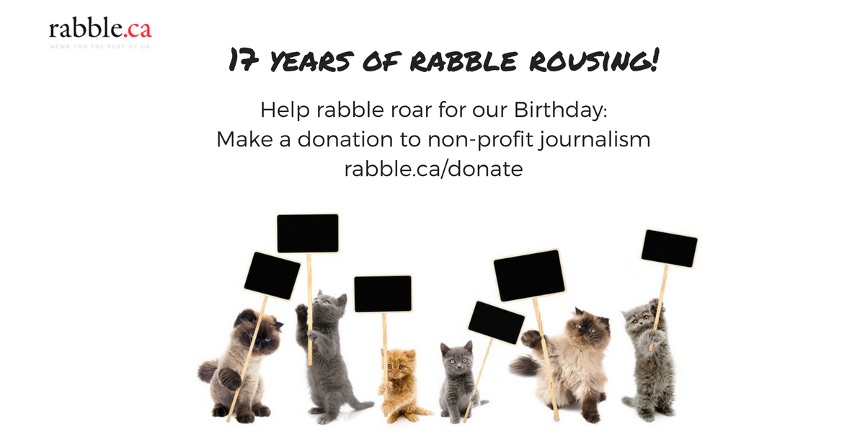rabble was born 17 years ago, on the eve of the Summit of the Americas, on April 18, 2001. In honour of the occasion, Judy Rebick, rabble’s co-founder, and Duncan Cameron, president emeritus of rabble, reflect on rabble’s impact and legacy.
rabble roars
Duncan Cameron [DC]: “Seventeen years ago, at the Quebec Summit of the Americas, rabble really emerged right in the midst of a major social movement to stop an incredibly stupid trade agreement — and it was stopped! rabble started engaged in life on the planet and life in the Americas and specifically life in Canada. The word for rabble is engagement — rabble engages citizens, people who say not only we need a better world but we’re going to make one.”
Judy Rebick [JR]: “We kicked off rabble from the Quebec City demonstrations against the G20, so from the beginning we identified with social movements, something very new at the time.”
The first of its kind
JR: “rabble was really one of the first online publications that attempted to reach around the mainstream media. There were alternate newspapers that tried to do that, but rabble was one of the first to create an independent media online in Canada.”
DC: “The key to rabble is that it’s Canadian and we discuss Canadian issues. It’s fairly easy to do something that’s local, and there’s a lot of international coverage out there. It’s very different to do something that’s Canadian. That’s the challenge, to try to be a real Canadian presence with small resources.”
babble while you rabble
DC: “rabble had its babble boards before Twitter or Facebook, so there were people meeting people on those boards who were discussing Canadian politics in a spirited, but moderated, environment. We had the first podcast network. We never ceased to innovate across that period of 17 years.”
JR: “The real innovation of rabble was babble: creating a space for our readers to talk to each other. Most of our traffic was from babble.”
rabble’s feminist roots
JR: “rabble was from the beginning female-led. Now is a time where we’re actually seeing a rise in feminism, so if anything, rabble should have more prominence.”
DC: “The spirit of feminism always permeated rabble. We’ve been feminist and engaged on feminist issues. To see that kind of widespread attention to feminist issues is key. It’s a desire to see the world not just as it is.”
Spirit of debate
DC: “When rabble arrived, […] people were turned off politics. We had a Liberal Party of Canada that no longer believed in liberalism, that believed in austerity policies common to the neoconservatives and neoliberals. We had a Conservative Party that didn’t believe in government, and then we had a main opposition party, the Parti Québécois, that didn’t believe in Canada. The NDP was the fourth or fifth party down the line, it was so far down it was barely breathing. And people thought they could be political without being involved involved in politics. It turned out to be so not true — if you’re not debating, you can’t change anything at all.”
JR: “The culture of rabble has always been open debate in the progressive community. Our political culture is less and less open to political debate. There’s not a lot of room for good intellectual debate anymore, just polarized or partisan debate. But rabble doesn’t do that, rabble doesn’t take a political position itself, it gives a space for people to debate.”
rabble thrives
JR: “It’s an incredible achievement that we’ve managed to sustain and develop such a valuable website, without any kind of venture capital or government funding. It’s totally funded by the community. Pretty impressive, I’d say.”
Well, you know what they say: it takes a village. So thank you for your continued support for rabble and our community. Here’s to many more years together.
Like this article? rabble is reader-supported journalism. 



